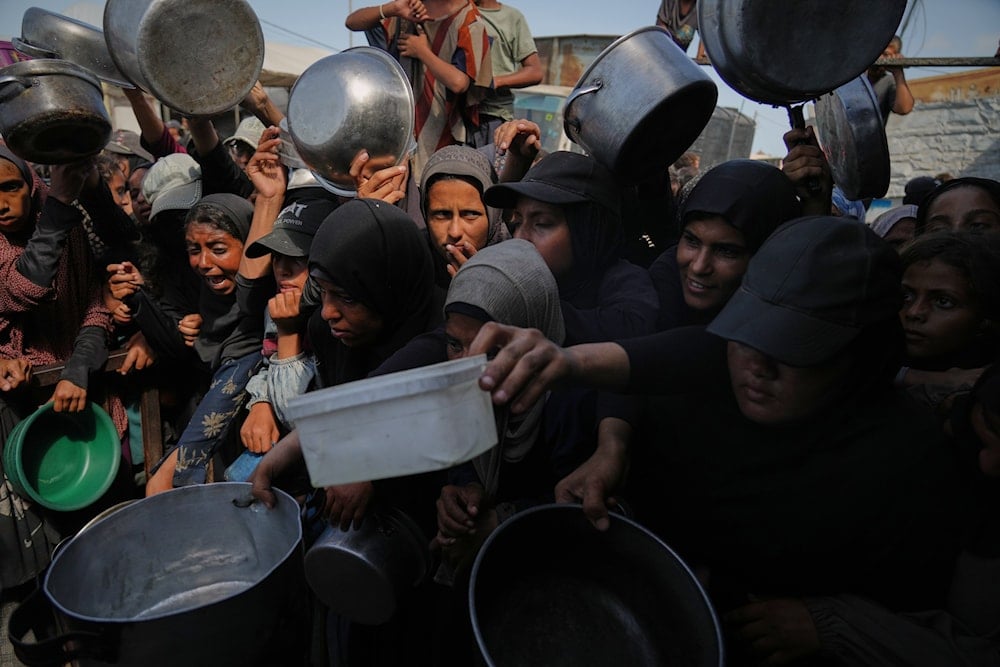Google hosts Israeli propaganda denying famine in Gaza
"Israel" promoted misleading videos on Gaza food access, despite famine reports, with Google backing their ads despite mounting complaints and violations of its policy.
-

Palestinians struggle to get donated food at a community kitchen in Khan Younis, southern Gaza Strip, Sunday, Oct. 5, 2025 (AP)
In late August, just days after a UN-backed organization reported a spreading famine in Gaza City, "Israel's" Ministry of Foreign Affairs released a video claiming that politicians and media were lying about food shortages. The video, dated July-August, depicted a well-stocked street market with vendors selling various goods to support the assertion that "There is food in Gaza."
The Israeli government paid to promote this video in three languages. According to its YouTube channel, the English version alone garnered over 7 million views before its ad campaign ended on August 29.
However, the footage lacked critical context. It depicted the first expensive food shipments to arrive after months of Israeli restrictions, according to the original photographer, and the high prices made the food unaffordable for most of Gaza's population.
Paid Israeli propaganda reaches millions of people
According to an internal Google email reviewed by The Washington Post, the video is part of a paid Israeli government campaign on YouTube that specifically focuses on the question of whether a famine is occurring in Gaza.
These videos, which address access to food in the region, have become some of the most viewed content on the Israeli Ministry of Foreign Affairs' channel, with individual English-language uploads attracting millions of views. The campaign's reach has been extended through promotion in several European languages, including Polish, Italian, Greek, and German.
According to a September 4th email and an interview with an anonymous Google employee, the online campaign has drawn a large number of complaints from multiple government authorities and others, who stated that the ads are spreading misinformation.
The company's website includes a rule prohibiting ads that deceive users by excluding relevant product information or providing misleading information. The email was sent by a member of Google’s Trust and Safety team, the group responsible for monitoring and enforcing the company’s content policies.
Complaints fail to take down Israeli lies
Despite the complaints filed against "Israel’s" videos about food access in Gaza, they remain online, and according to the internal Google email, that is where they will stay.
According to the September email, which stated that "The escalated ads do not violate our policies," a staffer wrote that legal and trust, and safety staff had determined the videos do not break Google’s rules banning ads that show “Dangerous or Derogatory Content, Shocking Content, Sensitive Events, and Unreliable Claims.”
Google advised its employees that any future Israeli video ads on this topic are “not in scope” of its policies, and therefore do not constitute violations.
A Google spokesman, Michael Aciman, stated in an email that the company has clear policies governing allowed ads and that teams constantly examine their application to current events, adding that any ads found to violate these policies are blocked or removed.
While the internal Google email that gave an all-clear to "Israel’s" ads did not specify which government authorities had complained, the Polish state research agency NASK confirmed via email that it told Google some of the Israeli government’s videos breached the company’s rules.
A statement from NASK to The Post explained that its experts had highlighted manipulated or false content in the ads and videos, which, according to community standards, should be removed, though news reports indicate that Google ultimately rejected the Polish government's complaint.
How 'Israel' manipulates context to cover its genocide
The Israeli Foreign Ministry posted two videos in late August, said to be from July and August, showing plentiful food in Gaza; however, at that time, food was still scarce and expensive and was just starting to enter after months of restrictions, according to a Washington Post review.
The footage in the August 24 video, which claimed "there is food in Gaza," came from Palestinian photographer Majdi Fathi, whose original caption stated that while people were rushing to buy the items, most could not afford them due to the extremely high prices.
According to WP, Fathi later told German broadcaster DW that the video was filmed at a Gaza market and explained that the fruits and vegetables shown were very expensive, adding that most people could not afford them. He also stated that he had found nothing else in the market to film.
Another Israeli government video from August 21 showed a roundup of restaurants all allegedly in Gaza that were serving pizza, calzones, and ice cream, but one of those restaurants, which The Post confirmed was Restaurant Hot Dog, had actually closed in May.
The restaurant has since reopened, with a Post analysis of its Instagram menu showing its median prices doubled over a six-month period between late February and early September.
Tech backs away from fact-checking
An anonymous Google employee in Trust and Safety, who spoke anonymously to protect their job, said the tech industry has been reducing its rigorous fact-checking this year, a trend that began when Meta decided to fire its fact-checkers in January.
These changes happened at the same time as corporate shifts in tech and other industries, where chief executives appeared to be moving to align themselves more with President Donald Trump.
The employee described the approach as more hands-off, explaining that ads can run as long as they are not doing anything really bad or calling for violence, and he said misinformation is only considered a policy violation if it involves election interference or public health risks.

 5 Min Read
5 Min Read









